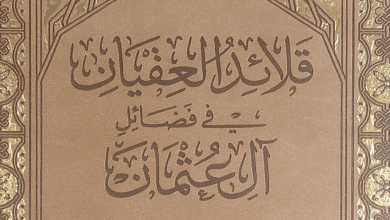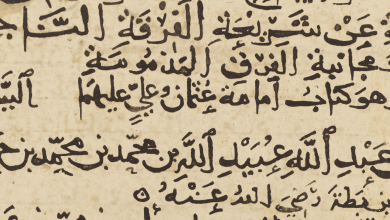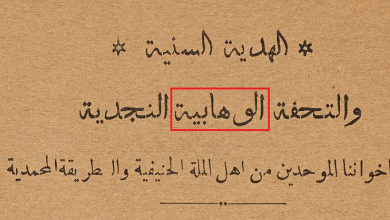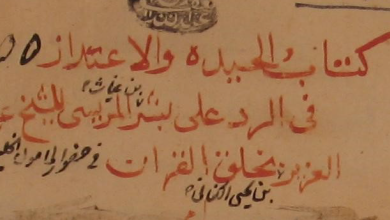Ḥātim al-‘Awnī: Imām Aḥmad ibn Ḥanbal Opposes Taymīs on the Nature of Divine Speech
Imām Aḥmad said: “Allāh has been eternally knowing and speaking.” (al-Miḥnah li Ḥanbal ibn Isḥāq, p. 102) This explanation contradicts the Taymī view, which claims that divine speech is eternal in genus but emergent in individual particulars, and that Allāh speaks with a temporally produced speech whenever He pleases. Here, you can see for yourself that Imām Aḥmad’s belief opposed this view. According to Imām Aḥmad, the attribute of speech is an eternal attribute. He states: “Allāh was eternally speaking.” (al-Miḥnah li Ḥanbal, pp.139–40) [1]
Abū Bakr al-Marrūdhī said: I heard Abū ‘Abdillāh (Aḥmad ibn Ḥanbal) say: “‘Indeed, to Him belongs the creation and the command,’ hence He has informed (us) that ‘the creation’ is creation and ‘the command’ is other than creation, which is His word. Allāh is not devoid of knowledge.” He said: “‘Indeed, We revealed the Reminder and We indeed are Preservers of it.’ The Reminder is the Qur’ān. Allāh is not devoid of these – Allāh has eternally been speaking and knowing.” He said elsewhere: “Allāh is not devoid of knowledge and speech. They are not from creation, as He has not been devoid of them. The Qur’ān is from Allāh’s knowledge.”
Al-Khallāl said following this: “The meaning of their speech from Abū ‘Abdillāh (Aḥmad ibn Ḥanbal) is one and the same. Al-Marrūdhī was more coherent in his expression.” (al-Sunnah li ‘l-Khallāl, 2:86–87)
‘Abdullāh ibn al-Imām Aḥmad said: “I said to my father that Luwayn Muḥammad ibn Sulaymān al-Asadī said that the first thing Allāh created is the pen, and Allāh has eternally been speaking before creating the creation. This pleased him, and he approved it.” (al-Sunnah li ‘l-Khallāl, no.1876)
Imām Aḥmad reiterated this meaning of the attribute of speech by saying: “The Qur’ān is from the knowledge of Allāh, and whoever claims that Allāh’s knowledge is created has disbelieved.” (al-Miḥnah li Ḥanbal, pp.102, 118).
This is mutawātir from Imām Aḥmad: that the Qur’ān is from Allāh’s eternal knowledge. Sometimes he said: “For indeed, Allāh’s knowledge is the Qur’ān.”
Imām Aḥmad conjoined knowledge and speech, as has preceded, when he said that Allāh has eternally been knowing and speaking. He did not believe that Allāh’s speech is renewed, just as he did not believe that Allāh’s knowledge is renewed. This is contrary to what the Taymīs believe about both divine knowledge and speech. (See Ibn Taymiyyah’s explanation of divine knowledge being renewed in al-Radd ʿala ‘l-Manṭiqiyyīn, pp.464–65.)
Imām Aḥmad deemed anyone who describes the Qur’ān or any part of it as being temporally produced to have disbelieved! Where is this from someone claiming to be affiliated with him, while asserting that divine speech is eternal in genus but emergent in individual particulars and claiming that its temporal emergence in Allāh’s being does not necessitate it is created?!
Imām Abū Dāwūd affirmed in Masā’il al-Imām Aḥmad the description of the Qur’ān as being inseparable from Allāh. He said: “I heard al-‘Anbarī say, I heard Abū ‘l-Walīd say: ‘The Qur’ān is Allāh’s speech, inseparable from Allāh.’” (Masā’il Abī Dāwūd, no.1717).
Al-‘Anbarī refers to al-‘Abbās ibn ‘Abd al-‘Aẓīm al-‘Anbarī, one of the ḥuffāẓ, who passed away in 240 AH. Abū ‘l-Walīd is Hishām ibn ‘Abd al-Malik al-Bāhilī al-Ṭayālisī, one of the major imāms of the Sunnah from the atbā‘ al-tābi‘īn, who passed away in 227 AH at the age of 94.
Given that the Qur’ān is inseparable from Allāh, that which separates and reaches the angel of revelation and from him to the Prophet ﷺ – what would that be?
Such a text does not catch the attention of superficial (Taymīs), and those (Taymīs) with understanding let it pass as it is. However, a shameless (Taymī) may attempt to distort its meaning. (al-Istiwā’ Ma‘lūm wa ‘l-Kayf Majhūl, Dār al-Mi‘rāj, pp.28–31) [2]
[1] Abū ‘l-Farj ‘Abd al-Wāḥid al-Shīrāzī al-Ḥanbalī (d. 486 AH) stated: “We say it is the revelation that has a beginning, not the speech itself. Allāh spoke the Qur’ān in eternity. When Muḥammad was appointed as a prophet, He then revealed it to him.” (al-Tabṣirah fī Uṣūl al-Dīn, p.77; see also: al-Taqrīrāt al-Ḥanbaliyyah ‘alā Mawāḍi‘ min al-Durrat al-Muḍiyyah, Dār al-Rayāḥīn, pp.167–9)
The eternal “letters and sounds” constituting Allāh’s eternal speech in the Ḥanbalī view can be understood as “letters and sounds” linked to divine knowledge. The physical letters and sounds that reach creation are of course not eternal. ‘Allāmah Idrīs Kandhlawī explains: “The eternal speech in the view of Imām Aḥmad ibn Ḥanbal is the attribute subsisting in the divine essence, i.e. the self-speech within divine knowledge. It is established that Imām Aḥmad ibn Ḥanbal said during a debate that the Qur’ān is from Allāh’s knowledge and Allāh’s knowledge is not created. In terms of the Qur’ān’s existence within divine knowledge, it includes both the text and meaning as both are in Allāh’s knowledge. Divine knowledge is an attribute that is eternal, subsisting within the divine essence, expressed and caused to be heard with (physical) words that indicate it.” (al-Kalām al-Mawthūq, Maktabat al-Ghānim, p. 118).
[2] Note: Lengthy citations and book details have been omitted. The content quoted here is not an endorsement of Ḥātim al-‘Awnī. He holds numerous problematic positions, but as the saying goes, “Even a broken clock is right twice a day.” What is noteworthy is that someone from a “Salafī” background has highlighted how Imām Aḥmad’s beliefs have been distorted by Ibn Taymiyyah and his Taymī followers.Taken from HERE






